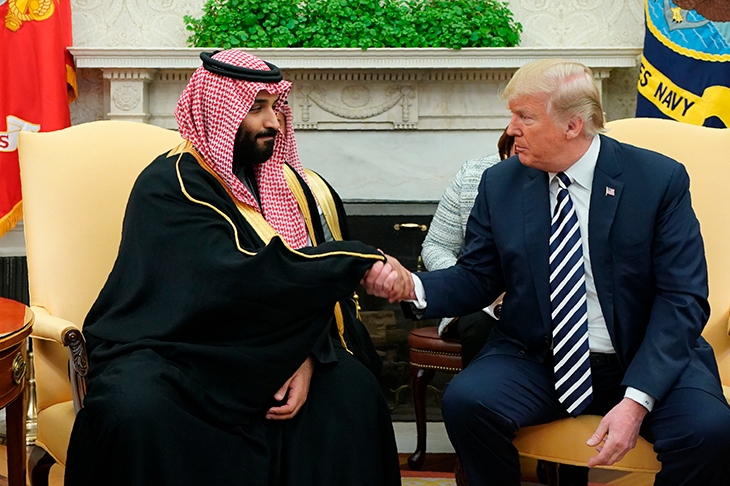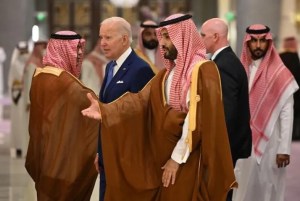Donald Trump said in October 2018 that the Saudi royal family ‘wouldn’t last two weeks’ without American military support. Last week, on the back of the collapse of the US fracking industry, he finally acted on his long-standing anti-Saudi instincts. He ordered the immediate withdrawal of two patriot air defense batteries, sent to defend the kingdom’s oil infrastructure in September after a missile attack blamed on the Iranians. He also recalled hundreds of US troops and said the US Navy presence in the Persian Gulf would be scaled back. Leaving with the ships were dozens of US fighter jets, which would have been crucial for defending against any full-scale Iranian assault.
Crown Prince Mohammed bin Salman, Saudi Arabia’s de facto leader who is used to throwing his considerable weight around with impunity, is now facing potentially devastating consequences for a decision that was reckless even by his own unenviable standards. In the middle of a pandemic, he had torpedoed the viability of US fracking by flooding the world with cheap oil. In retaliation, Trump is now edging away from the 75-year-old US-Saudi oil-for-security alliance. Some shocked analysts even saw the withdrawal as an inadvertent invitation to the Iranians to launch another attack.
Initially, the Pentagon did not discourage such conclusions. Its officials were quoted in the US media saying that Iran no longer posed a threat to American strategic interests in the region. And that could mean only one thing: that, having achieved energy self-sufficiency, the US is no longer dependent on Saudi oil. We were witnessing, then, an extraordinary reversal of decades of geo-political groupthink in Washington. In the past, any such Iranian attack would have threatened global economic growth (and American prosperity) by hiking oil prices. But now that fracking has made it the world’s largest oil company, America can be far more relaxed about oil prices rising
.While this pillar of the historic US-Saudi alliance — oil for security — was crumbling, so was another: America aligning with Saudi Arabia to defend Israel against Iran. Israeli defense officials — who offer a more realistic assessment of the threat posed by Iran to the Jewish state than its government — reported that Iran was withdrawing its military from Syria. The Iranians were invited by President Bashar al-Assad to help defeat Isis, and since that goal has largely been achieved, it makes sense that they are beginning to go home. They have become a headache for Assad, with Israel carrying out hundreds of air strikes on Iranian targets inside Syria that the Russians are unwilling to stop. Assad wants no war with Israel, and has nothing to gain by allowing Iran to launch one from his country.
Indeed, there have been signs in Washington of a possible détente with Tehran. Secretary of State Mike Pompeo clarified that while the US had stopped participating in talks surrounding the Iran nuclear deal, Washington had not officially withdrawn. It was a subtle acknowledgement that the US is coming to terms with the fact that its sanctions regime — for all of its cruel potency — has failed to bring the mullahs back to the negotiating table. Meanwhile, the two countries were making progress on a prisoner swap, which the Iranians are prepared to discuss — they insist ‘without preconditions’ — and which should bear fruit during the coming weeks.
Then, though, came the pushback, as it always does whenever Trump tries to fulfill his pledge to bring US troops home from the region. He withdrew troops from Syria only for others to be sent back in almost immediately. (It literally took two minutes for the same to happen in Iraq.) More recently Trump made it clear that he wants troops brought home from Afghanistan, but again he is being given the runaround by the military top brass. He also faces pretty stiff resistance as he attempts to edge away from Saudi Arabia. Pompeo and John Bolton’s former sidekick Brian Hook, who is now special representative for Iran, both gave statements saying that when it comes to US-Saudi relations, nothing has changed. James Jeffrey, the US special envoy to Syria, said the Israelis are exaggerating the extent of Iranian withdrawal. Under such pressure, Trump caved. Just one day after ordering the Saudi withdrawal, he was on the phone with the Saudi king, saying that the US was still committed to the kingdom’s defense.
That was then. Now, because of COVID-19, everything has changed. For a start, US troops and military hardware are not being redeployed to Saudi Arabia. In this and other ways, Trump continues, albeit in fits and starts, to lay the groundwork for a massive pullback from the region. During his first term, he has been shackled in the Middle East by having to keep the pro-Israel and anti-Iran hawks on side in the Senate, because they were blackmailing him over their possible support for impeachment otherwise. Likewise, he had to pacify the (pro-Israel) evangelical voting bloc, because he needs their votes to get re-elected. If he gets a second term, though, he would no longer need the support of either, and would be free at last to act on his own instincts.
After the assassination of Qasem Soleimani a few months ago, it had seemed that the hawks were winning and that America was gearing up for a fight. Now that conflict looks out of the question, with the US economy devastated by the virus. There never was any support for such adventurism among ordinary Americans, but in the current circumstances it would be considered an unforgivable act of insanity. If Trump is re-elected, moreover, Iran would be likely to come back to the negotiating table, because the country could not survive four more years of sanctions.
And anyway, with the fallout from Wuhan, the focus for Washington from now on will be China. America can only ever have one enemy — first it was communism, then radical Islam, and now it’s the Chinese Communist party. The generals may well end up agreeing with Trump that the US military is unable to fight on more than one front. If they do, America’s role in the Middle East will be radically redefined according to Trump’s non-interventionist principles.
This article was originally published in
The Spectator’s UK magazine. Subscribe to the US edition here.


















